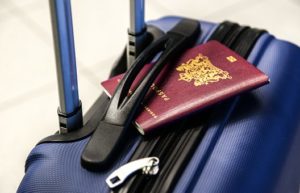Mandatory General Grounds for Refusal for Entry Clearance Applications
One of the Keys to a Successful Visa Application

Understanding general grounds for refusal for entry clearance application is one of the KEY components to your successful visa application. This is because irrespective of what type of your application you make, the decision-maker will always start considering it here. He or she will always start by checking if any of the general grounds for refusal apply to you. If you do not check it yourself before applying, the outcome may be disappointing. The decision-maker is most likely to refuse the application. Most importantly, they will keep the fee. This is because the UK immigration authorities take the fee not for granting the application but for the time spent considering it.
What is General Grounds for Refusal
In simple terms, this is an exercise of proving to the decision-maker that you are a ‘suitable person’ to enter the UK. There are two different terms for this: ‘general grounds for refusal’ and ‘suitability requirements’. They mean the same thing but are called differently because the Home Office introduced the term ‘general grounds for refusal’ significantly earlier than the term ‘suitability requirement’. I guess they have changed the terminology to make it sharper, to be more precise.
Mandatory General Grounds for Refusal for Entry Clearance Applications: The Difference
You will need to meet ‘the suitability requirements’ when making the applications to enter the UK as a partner or to remain as a partner or a visitor, as a family member of an EEA national and in some other cases.
However, this article is about general grounds, which you’ll need to meet when making your application as a Points Based System applicant (Tier 1, Tier 2, Tier 4 and Tier 5). General grounds for refusal also apply to the Startup and Innovator categories. You will need to prove that you are not caught by general grounds for refusal when applying as a Turkish business worker and in the majority of other UK Immigration routes.
In any case, all applications (with very little exceptions) under the UK Immigration Rules will be subject to either ‘general grounds’ or ‘suitability requirements’. As I explained before, they mean almost the same thing but can be found in different places.
Entry Clearance, Further Leave to Remain or Indefinite Leave to Remain?
Before you are completely put off by all these confusing legal terms, let me tell you that they are not as they may sound. They mean very simple things. Entry clearance is when you apply for your visa from outside the UK. Further Leave to Remain is when you apply to extend your visa in the UK. This term also applies to the applications when you ‘switch’ immigration categories. For example, when you entered the UK as a Tier 4 (General) Student and you want to remain in the UK as a spouse of a British Citizen. Indefinite leave to remain application is when you make an application to remain in the UK indefinitely.
In this article, I’ll explain mandatory general grounds for refusal for entry clearance applications. This is when you are outside the UK and apply for a visa to enter the UK.
Mandatory and Discretionary Grounds for Refusal
There is also a difference between mandatory and discretionary grounds for refusal. Mandatory is when the decision

maker has no choice but to refuse the application if one or more of the general grounds for refusal apply. Discretionary grounds for refusal is, as the word suggests when the decision maker has a choice, a ‘discretion’. In these circumstances, they can either allow or refuse the application. Let us begin with considering the mandatory grounds for refusal.
Mandatory General Grounds for Refusal
Play by the Rules
The application WILL be refused if you make an application, which is not covered by the UK Immigration Rules. The UK government define the rules of the game and you have to play by their rules.
No Run-in with the Law
The application will be refused if you are a subject to a deportation order or had a criminal conviction of over 4 years. If you had any criminal convictions between 12 months to 4 years, the decision maker will only allow your application after 10 years of this event happening. This is knowns as ‘spent convictions’. If you have a criminal conviction of less than 12 months, it’ll become ‘spent’ after 5 years.

No Passport No Visa No Entry
You have no chance of succeeding in your visa application if you cannot produce documents confirming your identity and your nationality. This applies to when you make an application and also when you arrive in the UK.
Conducive to the Public Good
The UK Immigration authorities will refuse your visa application where Secretary of State has personally directed that your exclusion from the United Kingdom is ‘conducive to the public good’. I will not bore you with a complex legal explanation of what they mean by ‘conducive to the public good’. This is because if you were excluded on these grounds, most likely you already know about this. By law, the Home Office should have sent you a letter offering a very detailed explanation.
Medical Reasons
The UK Immigration authorities may deny your application for medical reasons. This is normally in case of dangerous contagious diseases. In a lot of cases, they request applicants from certain countries to undergo a tuberculous examination. They insist on providing the results of this together with the visa application. You can check if your country is on the list HERE.
Mandatory General Grounds for Refusal for Entry Clearance Applications
Even White Lies Are Not Accepted
If you ever provide false information, documents or statements, if you fail to disclose facts, which are material to

your application, your application WILL be refused with severe consequences. Most likely you will be banned from reapplying for a very long time (10 years usually). However, this is not all. This dishonesty is very likely to affect the outcome of all future applications. Dishonesty cases are one of the toughest cases to appeal against. If you are caught once, they’ll never trust you again. My strongest suggestion to always be 100% honest in your application.
In certain cases, it will be cheaper, easier and quicker to reapply as opposed to appealing against the decision. This is NEVER the case where your integrity is questioned. If the decision maker made wrong assumptions, questioning your integrity – ALWAYS FIGHT STRONGLY against this decision. If the refusal was incorrect – always appeal it if you can. Always prove your point! If you let it slip, your reputation will be stained forever.
Poor Immigration History
If you here poor immigration history (became an overstayer), it will negatively affect the outcome of your application. This is unless you overstayed for less than 90 days before 6 April 2017. If you overstayed after 6 April 2017, the UKVI will disregard it if it was for less than 30 days and you left the country voluntary at your own expense. If you overstayed for more than 30 days and left voluntary at your own expense than you will need to wait for at least 12 months before you can apply again. However, in this case, the decision maker can still refuse your application on discretionary grounds.
If you overstayed, left the UK voluntary but at the expense of the Secretary of State, then you will need to wait for 5 years before applying. There are some exceptions to this general rule.
If you had a deportation order, you’ll need to wait for 10 years before reapplying.
If you left or were removed from the UK as a condition of a caution issued in accordance with section 22 of the Criminal Justice Act 2003 you’ll need to wait for 5 years ago before making your application.
When Your Overstaying Will Be Completely Disregarded
The UKVI will completely disregard your overstaying period if it was up to 28 days prior to 24 November 2016. Provided you made an application for leave to remain during that period of time and remained to wait for the application to be decided. This also applies when you appeal against the decision or applied for an administrative review.
The rules get stricter with time. After 24 November 2016, the Home Office will disregard overstaying only if it was for less than 14 days. Additionally, you’ll need to prove that there ‘was a good reason beyond your control’. You will need to provide strong objective documentary evidence to prove your case. This may include medical reports, death certificates and other reports from recognised reputable sources.
The decision-maker is also under an obligation to disregard the overstaying where there was a decision, which the Secretary of State subsequently withdrew or quashed. Sometimes, the Court or Tribunal may request the Secretary of State to reconsider the decision in whole or in part. It is unless you instigated the challenge more than three months from the date of the decision.
Failure to Show Up
The decision-maker will refuse your application if you fail to attend an interview without providing a reasonable explanation.
In my next article, I’ll explain discretionary general grounds for refusal for entry clearance applications.
Further Help
And finally, if you want to get a UK visa of any type, you need to understand the rules of the game. You also need to understand how to apply them correctly. UKVisaSuccess.com online courses help you do exactly that. After watching the course you need, you’ll dramatically reduce the chances of refusal of your visa application. It is because you’ll understand the application process and the requirements.
